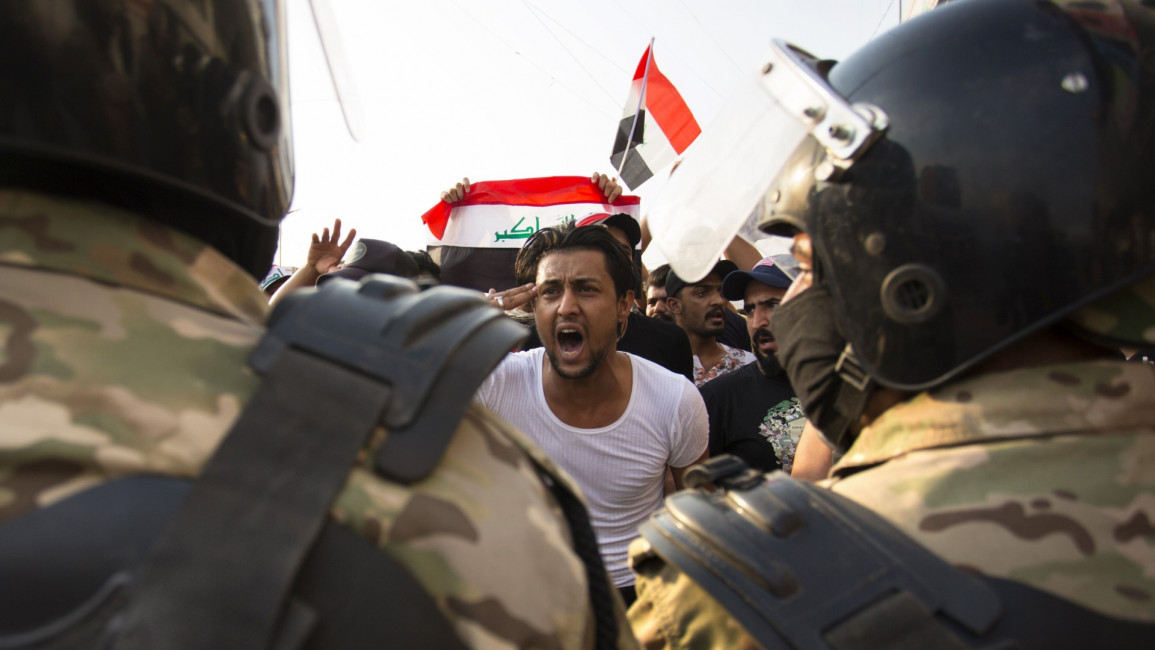Iraq protests erupt hours after formation of new al-Kadhimi government
Angry demonstrations broke out at dawn across the capital and southern governates, including Baghdad, Babel and Wasit, the latter of which saw protesters burn down the Badr Organisation’s party headquarters, according to Arabi21.
Videos that emerged online showed demonstrators in Baghdad call for the downfall of the regime, which they accuse of being part of the same “corrupt” former government.
The protests were triggered by the announcement of a new government led by al-Kadhimi, who with 15 of his proposed 22 ministers won the confidence of Parliament on Wednesday evening, promised "the truth about everything that happened" during the months-long protests.
He vowed to "hold to account all those who shed Iraqi blood".
Kadhimi was Iraq's spy chief when the October protests broke out. His address to the nation was quickly followed by calls on social media for renewed demonstrations on Sunday.
"The protests rose again despite Covid-19 precautions due to the government’s insistence on forming another cabinet based on the ethnic-sectarian quota by the same political class," Iraqi politial analyst, Zeidon Alkinani told The New Arab.
"Despite the release of several prisoners from the uprisings, returning Lt. General Abdulwahab al-Saidi to chief of CTS and other PM decisions to buy the hearts and minds of the people, the protest movement is ensuring its continuous civil disobedience until the parliament dissolves itself, rewrite the constitution, and have new free general elections beyond the Muhasasa negotiations, as well as regulations under international monitoring," Alkinani added.
The government of al-Kadhimi's predecessor, Adel Abdel Mahdi had since October repeatedly said it could not find the "unidentified gunmen" who fired on protesters who took to the streets to demand the overhaul of the political system.
Twitter Post
|
At the start of the protests that would become the largest and bloodiest social movement in Iraq's recent history, many demonstrators carried portraits of General Abdulwahab al-Saadi - a highly popular figure in the military campaign to dislodge the Islamic State from Mosul in 2017. He had been dismissed by Abdel Mahdi in September.
Kadhimi on Saturday reinstated the general as the head of counter-terrorism, putting him back in charge of units created and armed by the Americans.
The new Iraqi premier has long been seen as Washington's man in Baghdad, but he has also forged close ties with America's arch-foe Iran.
Kadhimi also called on parliament to adopt a new electoral law needed for early elections that had been promised by his predecessor.
The new government had presented itself as a "transitional" cabinet on Wednesday evening.
It rescinded a decision taken by the outgoing government just before it stepped down that blocked all state spending, including civil servants' salaries and pension payments - relied on by one in five Iraqis.
Pensions will be paid out in the coming days, Kadhimi promised.
But an implosion of oil prices amid the coronavirus pandemic indicates that Iraq will have little option but to impose austerity policies that could give rise to renewed protests.
Follow us on Facebook, Twitter and Instagram to stay connected



